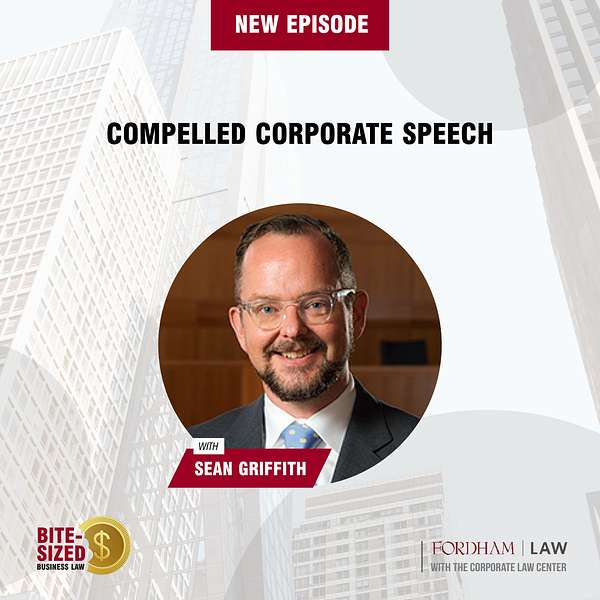
Bite-Sized Business Law
Looking for the latest in legal business news?
Get a breakdown of the top stories in business law from industry leaders on the front lines with Bite-Sized Business Law. Host Amy Martella takes a closer look at the latest corporate happenings through interviews with the attorneys, legal experts, public figures, and scholars behind the news to distill business law’s biggest stories into bite-sized portions.
This is your chance to go further into the world of business law and stay up to date with legal cases and industry trends.
Corporations impact us all, leading changes that extend far beyond business to shape the economy, public policy, technology, and beyond. Looking at the big picture, Amy discusses not only the underlying issues in business ethics and legal cases leading the biggest stories but also sparks thought-provoking discussions on where the law should be headed.
Amy is the Executive Director of the Corporate Law Center at Fordham University School of Law. Her background ranges from big law to government to tech startups, allowing her to offer an insider’s perspective of the issues that shape corporate actions, large and small. Covering crypto regulation to securities fraud, AI’s impact to Elon Musk’s pay package, Bite-Sized Business Law covers it all with guests of varying viewpoints to provide the nuanced analysis needed to tackle complex problems.
Whether you're looking for the latest in legal insight on intellectual property, mergers and acquisitions, business ethics or legal cases in the business law world, you’ll find it here. Enjoying a thoughtful perspective on the news stories of the moment, Bite-Sized Business Law examines big issues and delivers them in small doses.
Bite-Sized Business Law is a project by the Corporate Law Center at Fordham Law. The Center serves as a hub for scholars, professionals, policymakers, and students to engage in the study, discussion, and debate of current issues in corporate law. The Center focuses on aspects of corporate law, corporate compliance, antitrust law, and securities regulation. Through initiatives like the Mergers and Acquisitions seminar and the Securities Litigation and Arbitration Clinic, students actively engage in real-world research and cases, bridging the gap between classroom learning and practical application in the legal field.
Bite-Sized Business Law
Sean Griffith on Compelled Corporate Speech
Use Left/Right to seek, Home/End to jump to start or end. Hold shift to jump forward or backward.
Do shareholder proposals compel corporations to speak in ways that violate the First Amendment? Although shareholder proposals have been studied from numerous angles, the concept of compelled speech is fairly novel. And this question raises several other inquiries, including the nature of corporate purpose and the rationale behind negative speech rights in the first place. Joining us to discuss this fascinating proposition is Professor Sean J. Griffith, the T.J. Maloney Chair in Business Law at Fordham Law School, a former Director of the Fordham Corporate Law Center, and an expert in corporate and securities law. Tuning in, you’ll gain insight into Sean’s paper, ‘Shareholder Proposals and the Negative Speech Rights of Corporations’, how the shareholder proposal rule predominantly relates to sociopolitical issues rather than financial or company performance issues, and how it compels corporations to speak on controversial issues. We also touch on a corporation’s right to religious freedom, what companies can do to oppose shareholder proposals and much more, so be sure to listen in today!
Key Points From This Episode:
- What inspired Sean to write articles on shareholder proposals and corporate speech.
- Corporations that the shareholder proposal rule applies to and what it entails.
- How the shareholder rule (Rule 14a-8) has evolved since its inception.
- Ways that shareholder proposals compel corporations to speak on controversial issues.
- Supreme court cases that illustrate violations of companies’ First Amendment rights.
- Insight into how a company might seek exclusion from the SEC.
- The relationship between corporate negative speech rights and corporate purpose.
- Intrinsic interests, corporate souls, and the rationale behind negative speech rights.
- Whether or not every social “hot button” issue affects a company’s financial performance.
- How companies can seek to exclude shareholder proposals.
- Why existing policy arguments for and against shareholder proposals haven’t necessarily included First Amendment rights.
Links Mentioned in Today’s Episode:
‘Shareholder Proposals and the Negative Speech Rights of Corporations’